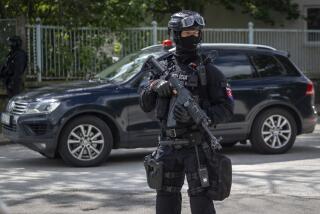Havel Assumes Czechoslovak Presidency
- Share via
PRAGUE, Czechoslovakia — Vaclav Havel, the defiant playwright who rode a gentle revolt from a prison cell to the halls of Parliament, assumed the presidency Friday in an emotional climax to an electrifying year.
The masses who chanted “Havel to the castle!” during the angry rallies of November thrilled to the sight of the dissident actually in Hradcany Castle, taking the oath beneath the nation’s red, white and blue flag. Cannons boomed and a military band played the national anthem.
“I promise I won’t betray your trust. I will take the country to free elections, and that’s a task for us all,” the 53-year-old president told the cheering crowd from the balcony of the towering medieval castle.
Havel, whose plays and essays in defense of civil liberty earned him jail terms totaling five years, languished in a cell eight months ago. On Friday, a special session of Parliament elected him Czechoslovakia’s ninth president.
The election by 323 deputies, most of whom are Communists, was a historic victory for the pro-democracy movement that in 41 days has broken the party’s stranglehold on power.
Among his first acts of office, Havel named as chief of staff Josef Lzicar, the attorney who defended him and other prominent dissidents.
Havel also is planning an amnesty program, the details of which are to be announced New Year’s Day, the state news agency CTK reported.
Havel’s election is part of a sweeping series of accords between the opposition and the Communists that are to lead to free elections next year.
It came one day after Alexander Dubcek, the ousted Communist Party chief who led the “Prague Spring” reforms that were crushed in 1968, was named Speaker of the Parliament in another stunning rebuke to the repression of the past.
It also comes two days after the Bulgarian government agreed to talks with the opposition, seven days after the government was overthrown in Romania, seven weeks after the Berlin Wall was opened by East Germany, five months after a Solidarity activist became prime minister of Poland, seven months after Hungary opened its borders to the West, and eight months after the Soviet Union held its first competitive elections in 70 years.
During his somber inauguration, Communist Prime Minister Marian Calfa praised him as “a man who is faithful to his beliefs despite persecution.”
“He never accepted offers from his friends or recommendations by his enemies to emigrate where the conditions of his life would have been more comfortable,” Calfa said in a nominating speech.
Havel walked the aisle with Dubcek as Communist deputies applauded decorously, cameras flashed and the band played a stirring fanfare.
The playwright signed the oath of office, which was amended just Thursday to delete a pledge of allegiance to socialism.
Tears filled the eyes of a few opposition members and old friends of Havel who watched the 20-minute ceremony from the back of the hall.
Twenty cannon salvos fired from the castle on the Plain of Letna boomed over central Prague below.
Havel, whose plays have been banned in Czechoslovakia since 1968, agreed to take the presidency for six months leading to free elections in mid-1990.
“This must happen in a decent and peaceful way so that the clean face of our revolution is not sullied. It is a task for us all,” he told the crowd from the castle balcony after taking the oath of office.
“Long live Havel!” they chanted as he and, Olga, his wife of 30 years, left the balcony to walk across the courtyard to St. Vitus Cathedral for a special Mass of thanksgiving.
Then, Havel became the first president since the Communists took power in 1948 to attend the Roman Catholic Mass, traditionally part of the inaugural ceremony.
Havel’s appearance at the nationally televised Mass was significant for the country’s 9 million Catholics, who suffered repression for their faith under the Communists.
After dark, Havel briefly joined several thousand people waiting in the cold on Prague’s Old Town Square. The blond, mustachioed president wore a dark blue overcoat, blue suit and striped tie rather than his usual cardigan and corduroy slacks.
He made no speech but smiled and waved from the castle balcony to those below on the baroque square.
More to Read
Sign up for Essential California
The most important California stories and recommendations in your inbox every morning.
You may occasionally receive promotional content from the Los Angeles Times.













